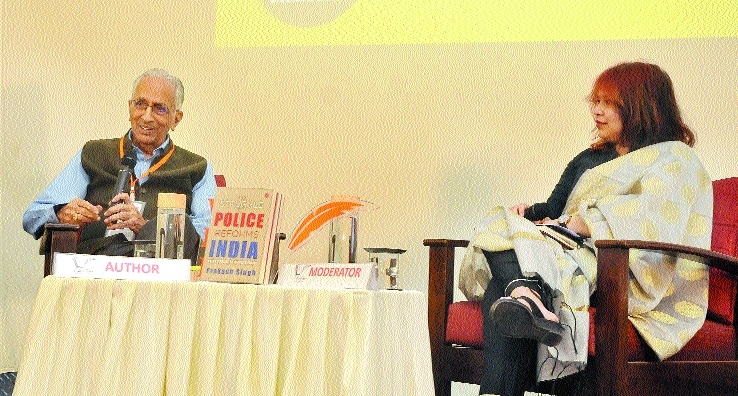Growing ‘Yes sir’ culture destroying police forces: Ex-DGP Prakash Singh
30 Oct 2022 12:17:08

Ex DGP Prakash Singh making a point during a conversation with Adv Anita Sarkar organised by VLF, on Saturday. (Pic: Anil Futane)
Staff Reporter :
‘Padma Shri’ Prakash Singh, retired Director General (DG) Border Security Force, on Saturday, said that growing ‘Yes sir’ culture was destroying the police forces in India. The ex-Chief of Uttar Pradesh and Assam Police, observed that a lot of young police officers were being attracted to prospects of immediate material gains for which they were ready to follow ‘every’ order of their superiors or politicians. “I have seen many upright police officers slowly shedding their idealism and falling prey to the traps. It depends on your character and how much you are ready to suffer. The officers should have the courage to say ‘no’ to unethical orders,” Singh stressed. Prakash Singh, a 1959 batch IPS officer, and author of critically acclaimed book ‘The Struggle for Police Reforms in India’, was speaking to moderator Adv Ankita Sarkar during a session organised by Vidarbha Literary Festival (VLF) at Chitnavis Centre here. Citing an example of former Mumbai Police Commissioner Parambir Singh, Prakash Singh said that Parambir Singh was part of a nexus operating on the instructions of the then Home Minister Anil Deshmukh. “Why do an officer of the rank of Police Commissioner need to follow such orders?”, he questioned.
The police officer must say ‘no’ to politicians for such a nexus, he added. “As the officers are also pocketing money through such a conspiracy, they become part of it,” he said. Singh said that the police cadre was not getting proper training in India. Quoting statistics, he said, only five per cent policemen are getting training every five years for their service. “Disgruntled and dissatisfied officers are being posted at police training centre. What can one expect from such officers ?,” he asked. Stressing upon the need for police reforms, Singh said, the Police Act was enacted in 1861 by Britishers with the sole purpose of having ‘politically useful police’ to retain their hold on the Indian sub-continent. Since then, the necessary police reforms were not pushed by any Indian government. It may be noted that the Supreme Court passed a judgment on a PIL filed by Singh and others on several issues concerning police reforms. “The Model Police Act, 2006, proposed by Soli Sorabji committee is yet to be functional across the country,” he rued and suggested the Centre to take an initiative to implement reforms in all States. Singh, who has an excellent track record of combating terrorism/insurgency in the most turbulent theaters of the country, claimed that the Naxal problem was ‘outsourced’ by States to the Centre.
“The problem will be solved only when the State police deals with it with full force,” he observed. Again quoting statistics, Singh claimed that India’s Gross Domestic Product was affected by seven per cent due to separatist movements in the North East, Naxal movement, and Kashmir problems. “These problems were dragged on for so long due to absence of political will,” he said. Sharing with the audience the ups and downs in his career, Singh said, “I was always uncompromising on my principles.” To a query on increasing clashes in the Central Armed Police Force (CAPF), Singh replied that the CAPF needed better man-management and administration to stop the clashes. The senior officers of CAPF should take care of the subordinates like children. Then only, the problem would be solved, he said. DCP Zone III and IV Gajanan Rajmane also addressed the gathering and explained the importance of police in the society. He also shed light on the Naxal problem. Earlier, Sunand Julme, Assistant Professor, Kamla Nehru College, spoke about her book ‘Savitribainchi Charitragatha’. Aditi Jain compered the programme while Sachin Jahagirdar, Secretary of VLF, proposed a vote of thanks.